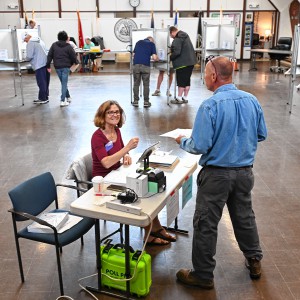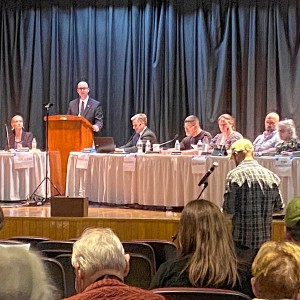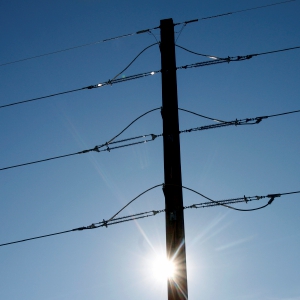Connecting the Dots: Hopeless and yet hopeful — Overcoming ‘doomer’ mentality
| Published: 08-04-2023 5:30 PM |
I must admit that I am one of those people who believes we have passed the tipping point that guarantees our climate crisis can be turned around. My belief is based primarily on: what I have learned about “those” who control the legislation so essential to stemming carbon emissions; on how corporate practices reliant upon the extraction of fossil fuels to maintain their bottom line are preserved; and lastly, how a small number of billionaire owners from Elon Musk to Rupert Murdoch have a powerful hold on so much of the information that reaches the public. News media that wants to please all sides by engaging in false equivalence in the name of “neutral” reporting (aka the bottom line).
How about the issue of right and wrong and naming who is responsible? Both are often missing from our American news media bubble. The result is widespread defeatism about solving our catastrophic climate crisis.
Rebecca Solnit’s climate anthology “Not Too Late: Changing the Climate Story from Despair to Possibility” is a must read. She writes that the climate scientist Zeke Hausfather said, “It’s fair to say that recently many of us climate scientists have spent more time arguing with the ‘doomers’ than with the ‘deniers’ in a Washington Post story titled, ‘Why climate ‘doomers’ are replacing climate ‘deniers.’’ The people putting out defeatist frameworks have more impact than outright deniers, not least because deniers are rightwingers and the right is already committed to climate inaction. Doomers discourage people who otherwise might act, so they’re working toward the worst outcomes they claim to dread.”
Despite the widely held view that experiencing climate change might lead to greater acceptance of climate policy, research on the link between public opinion and climate events is mixed. It’s not clear one way or the other whether extreme weather triggers people to reassess their views on climate change. Partisanship matters here. A 2020 paper in the journal Nature Climate Change pointed to a clear dividing line in the U.S. Extreme weather tends to reinforce the link between climate change and weather effects in Democratic and/or highly educated communities — and less so elsewhere.
This dynamic means that extreme weather may actually be creating an opportunity for conservatives to cater to their base. As heat waves or flooding raises the specter of climate change for certain groups, others can use it to raise the specter of the costs of climate policy to rally their base.
Solnit wrote “I was told the public doesn’t care, a couple of other people told me that ‘the media is not covering’ the climate crisis. This was a reasonable position five or 10 years ago, but isn’t at present. Mainstream print media, with its own enthusiasm for grim takes, oversimplification of nuanced climate reports, and distractions like last fall’s fake fusion energy breakthrough, is not doing the job the way I’d like to see it get done. But it is covering climate. There were, for example, multiple climate stories on the online front pages of the Washington Post and the New York Times that day.”
The same is true for our local Recorder. As little as three years ago, articles about climate change appeared only occasionally. Today there is the weekly Earthtalk column each Monday, regular inclusion of local and national environmental articles, and a continuing flow of letters and My Turn columns on the opinion page.
Solnit writes “I don’t know why so many people seem to think it’s their job to spread discouragement, but it seems to be a muddle about the relationship between facts and feelings. I keep saying I respect despair as an emotion, but not as an analysis.” That last sentence is extremely important to me.
Article continues after...
Yesterday's Most Read Articles
 Political newcomer defeats Shores Ness for Deerfield Selectboard seat
Political newcomer defeats Shores Ness for Deerfield Selectboard seat
 South County Senior Center opts not to renew church lease after rift over LGBTQ program
South County Senior Center opts not to renew church lease after rift over LGBTQ program
 More than 130 arrested at pro-Palestinian protest at UMass
More than 130 arrested at pro-Palestinian protest at UMass
 As I See It: Between Israel and Palestine: Which side should we be on, and why?
As I See It: Between Israel and Palestine: Which side should we be on, and why?
 Moratoriums on large-scale solar, battery storage passed in Northfield
Moratoriums on large-scale solar, battery storage passed in Northfield
 Bridge of Flowers in Shelburne Falls to open on plant sale day, May 11
Bridge of Flowers in Shelburne Falls to open on plant sale day, May 11
It makes me wonder if my own defeatist feelings are because I don’t think I can feel hopeful and hopeless at the same time. A couple of people I deeply respect have said to me “Of course you can.”
“You can feel absolutely devastated about the situation and not assume this predicts outcome;” Solnit states, “you can have your feelings and can still chase down facts from reliable sources, and the facts tell us that the general public is not the problem; the fossil fuel industry and other vested interests are; that we have the solutions, that we know what to do, and that the obstacles are political; that when we fight we sometimes win; and that we are deciding the future now.”
Rebecca Solnit has helped me back onto the path of possibility.
“Connecting the Dots” is published every other Saturday in the Recorder. John Bos is also a contributing writer for “Green Energy Times.” Questions and comments are always welcome at john01370@gmail.com.
]]>

 My Turn: No good answers with utilities in control
My Turn: No good answers with utilities in control My Turn: Blame Hamas for the suffering of Palestinians
My Turn: Blame Hamas for the suffering of Palestinians Ahmad Esfahani: Democratic lagging
Ahmad Esfahani: Democratic lagging Evlyn Ashong-Katai: Back tax fund for elderly, disabled
Evlyn Ashong-Katai: Back tax fund for elderly, disabled
